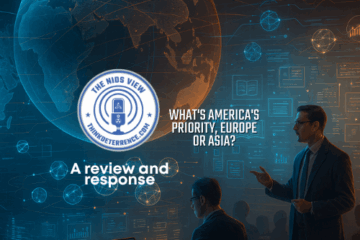In an era where political pundits are quick to sound alarms about the impending decline of American global leadership, the reality paints a more optimistic picture. While the rise of China, the resurgence of Russia, and the saber-rattling of North Korea and Iran led some to predict a seismic shift in world power, a closer examination reveals that the United States remains firmly entrenched as the world’s leading hegemon, with little reason to believe that will change anytime soon.
A Network of Powerful Allies
One of the strongest indicators of America’s continued leadership is its robust network of alliances. Over 50 nations are directly allied with the US, forming a global coalition that includes some of the world’s most powerful economies. Countries like Japan, the United Kingdom, France, and Australia consistently align themselves with American leadership, not just in military terms but also economically and diplomatically. Even in regions like the Middle East, traditional allies such as Saudi Arabia and emerging partnerships are fortifying the US’s global standing.
Contrast this with the coalition of China, Russia, North Korea, and Iran. While this quartet may represent a serious challenge, it pales in comparison to the extensive alliances that the US leads. Most crucially, while Russia and China may appear aligned in the short term, they are not close allies in any deep or historical sense. The two powers have a long and fraught history, marked by strategic rivalry and suspicion. Their partnership today is one of convenience rather than genuine alignment. In the end, history tells us that such partnerships are prone to fracture, especially when national interests clash.
The reality of America’s network of allies compared to the alliance of China, Russia, North Korea, and Iran is stark. This balancing coalition does not even come close to the strength of the band wagoning coalition the US possesses. For instance, the North Atlantic Treaty Organization (NATO), with its 31 member states, represents not only the most powerful military alliance in history but also an economic powerhouse, accounting for over 30 percent of global gross domestic product (GDP).
In contrast, China and Russia are economic competitors more than collaborators, and their combined GDP does not come close to rivaling the economic output of the US and its allies. Furthermore, China’s partnerships with nations like Iran and North Korea are limited by geography, sanctions, and divergent interests. North Korea is a heavily sanctioned and isolated state with little economic or strategic leverage beyond its nuclear capabilities, while Iran is mired in regional conflicts that prevent it from playing a major global role.
In essence, while China, Russia, North Korea, and Iran may occasionally coordinate to challenge the West, their relationships lack the cohesion, shared values, and the long-term strategic alignment of the American-led alliance system. This coalition cannot hope to rival the strength, stability, and global reach of America’s network of alliances. For all the talk of a multipolar world, the US remains at the center of the most powerful and united coalition of nations in modern history, a fact that ensures its continued dominance on the global stage.
The Strategic Advantage of Geography
Another underappreciated advantage is geography. The United States enjoys a position of unmatched security, largely thanks to what scholars like John Mearsheimer call the “stopping power of water.” Unlike any other global power, the United States benefits from being bordered by two vast oceans. These natural barriers serve as formidable buffers against potential adversaries, significantly reducing the likelihood of direct invasion or immediate military threats to the mainland.
This geographic advantage has profound implications for national security and global influence. Unlike Russia, which shares extensive borders with Europe and Central Asia, and China, which borders several regional rivals including India, Japan, and Vietnam, the US is largely insulated from the chaos of regional disputes.
Moreover, this geographic separation means that the US can maintain a relatively smaller standing army compared to continental powers—focusing instead on advanced naval and air forces capable of projecting power far from its shores. American military bases, fleets, and alliances stretch across the world, but the mainland remains safely beyond the reach of conventional military threats.
This position gives the US a level of strategic flexibility that few nations can match. That is not to say the US Navy does not have issues facing its future, especially with shipyards and defense procurement. However, it is still considered the greatest Navy in the world as of 2024.
The Monroe Doctrine
Part of what makes the US so unique is its role as the uncontested regional hegemon in the Western Hemisphere. The Monroe Doctrine has long established the principle that no foreign power should interfere in the affairs of the Americas, solidifying U.S. dominance in its own region. No other nation on Earth holds this level of regional control.
This unrivaled regional hegemony allows the US to focus on maintaining global stability and leading from a position of strength. As long as the Western Hemisphere remains secure, the US can project power abroad with confidence, knowing that its backyard is free from external threats.
The Interconnected Economies of the U.S. and China
Finally, the specter of the so-called Thucydides Trap—the idea that a rising power (China) will inevitably clash with an established one (the US)—is not as likely as it may seem. While it is true that China’s economic and military rise is a concern, the interconnectedness of the two economies makes a full-blown conflict far less probable. The US and China are not just rivals; they are deeply intertwined economically. From trade to investment to the global supply chain, the economic fates of both nations are linked in ways that make large-scale conflict costly for either side.
This economic entanglement offers a powerful deterrent against conflict. Both nations have a vested interest in maintaining peace and stability, knowing that any war would be mutually destructive. This interdependence, in many ways, acts as a stabilizing force, reducing the likelihood that the US and China will fall into the trap of inevitable conflict. However, it is worth noting that much of the same was said about the European powers just before World War I.
Conclusion: A Future of Optimism, Not Decline
Despite the challenges posed by emerging powers and the uncertainties of the global political landscape, the US remains in a position of unparalleled strength. Its vast network of powerful allies, its strategic geographic advantage, the stability of the Monroe Doctrine, and the economic interdependence with China all suggest that the US’s role as the world’s leading hegemon is secure for the foreseeable future.
Rather than succumbing to the doom and gloom of some political pundits, it is time to recognize the many reasons for optimism. The US has the tools, alliances, and strategic advantages to maintain its leadership and continue shaping a peaceful, prosperous global order.
Aaron Holland is a PhD candidate at the University of Utah and an Analyst at the National Institute for Deterrence Studies. All views expressed here are the author’s own.
About the Author

Aaron Holland
Aaron Holland is an Analyst at the National Institute for Deterrence Studies.





Aaron makes some very valid points. I agree that positivism and optimism now are called for, and are very appropriate. How is Cold War II, now in high gear, different from Cold War I, except to the greatly advancing technologies and the somewhat (but NOT entirely) different geostrategic faceoffs? Answer: It isn’t that different. Once again, at least one other superpower vies with the U.S. for world leadership, and once again the final outcome is not clear. The U.S. does need to be much more cautious this go-round, and act with great urgency and pragmatism on the budgeting and acquisiition fronts, because our defense industrial capacity has been weakened, by years of “peace dividends” and “globalization” and other liberal ideological nonsense. And one more word of caution, if I may, please: Trade/financial ties between adversaries have never prevented war. Look at Germany and the UK in WWI, the North and the South in our War Between the States, and even between the U.S. and the Axis States in WWII. Aaron has as always done a great job with this essay!